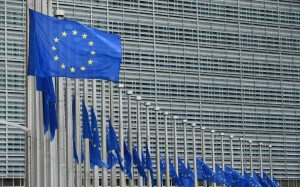BRUSSELS — President-elect Donald Trump’s transition team may be expecting the European Union to fall apart this year, the outgoing U.S. ambassador to the 28-nation bloc said Friday, saying that the incoming U.S. administration may add to the burdens of an already struggling union.
Trump officials risk “lunacy” if they choose to support the fragmentation of Europe, Ambassador Anthony Gardner said in an unusually frank exit discussion with reporters. Gardner is an ally of President Obama who has been forced to resign, along with all other political ambassadorial appointees, on Jan. 20.
Gardner said that the E.U. remains more robust than is usually perceived in the United States. But he said he fears that a Euroskeptic Trump administration would harm U.S. and European interests if it continued to embrace anti-E.U. leaders such as Nigel Farage, a major leader of the successful British campaign to leave the E.U., known as Brexit.
In transition officials’ calls with E.U. leaders, their first question was, Gardner said, “What country is about to leave next after the U.K.?”
He declined to name which officials were involved in the discussions and said that embassy officials had not taken part.
Europe faces a punishing schedule in the coming months. Elections in the Netherlands, France and Germany could all promote the power of anti-immigrant, anti-E.U. leaders. The effect would be a significant retreat for the efforts made after World War II to bind European nations so tightly together that they could never again go to war with each other.
The policy of the Obama administration — and all previous U.S. administrations, Republican and Democratic, since 1945 — has been to push for as much integration as possible. Obama and his surrogates, including Secretary of State John F. Kerry, have often made more impassioned arguments on behalf of European ideals than European leaders themselves. E.U. politicians have struggled with years of economic stagnation and a surging refugee population that has exacerbated voters’ fears for the future.
Trump called himself “Mr. Brexit” during the campaign and embraced leaders such as Farage, even suggesting that he should be appointed British ambassador to the United States. Anti-E.U. leaders in France have also said they received calls from members of the Trump transition team offering support. The anti-immigrant French presidential candidate Marine Le Pen ate lunch Thursday in the basement of Trump Tower in New York, although her team declined to say whether she was there because of Trump. Trump spokesman denied any meeting took place.
Those close contacts unsettle mainstream European leaders, including conservatives who have long been allied with Republicans.
“If we suddenly stop being the underwriters of the system we built after the Second World War, then a lot of bad things can happen,” Gardner said.
But he said that he feared that the idealism and values that for seven decades have bound together Europe and the United States were at risk with Trump’s arrival.
“Never before will the weight of history be so heavy on the shoulders of Europe to carry the flame of democracy, human rights and values that have guided transatlantic partnership for decades,” he said. “Nothing can be taken for granted right now. The violence of our political discourse, the vulgarity of our political discourse, to see that things were unacceptable a few years ago are now acceptable, I find it profoundly shocking.”
Gardner acknowledged cheerfully that he was abandoning traditional diplomatic discipline, looking ahead to a return to private life in a week.
“I figured I might as well go out in a ball of flame,” he said.





